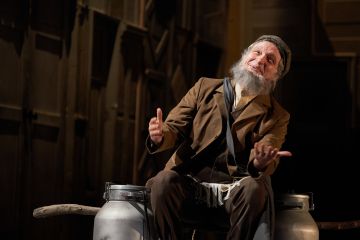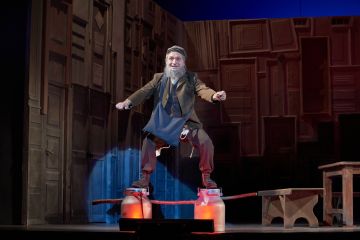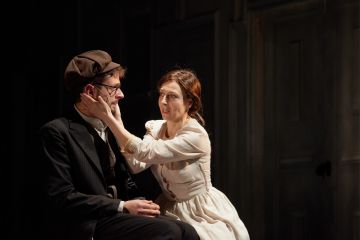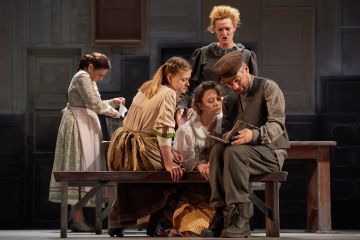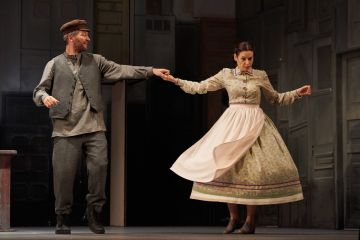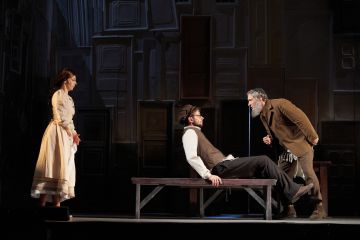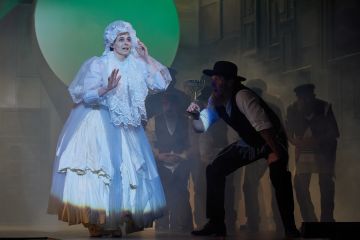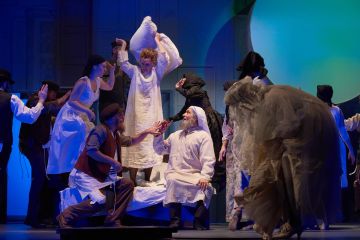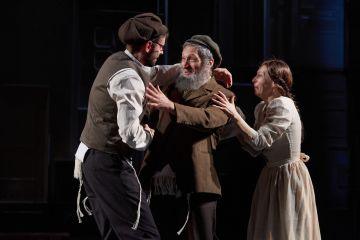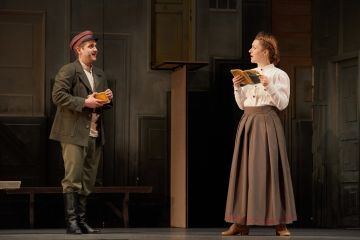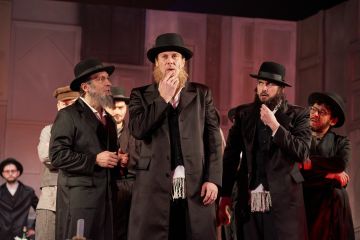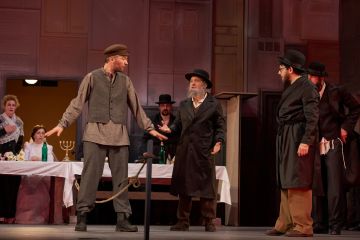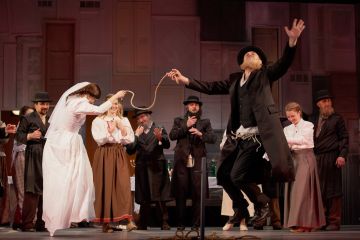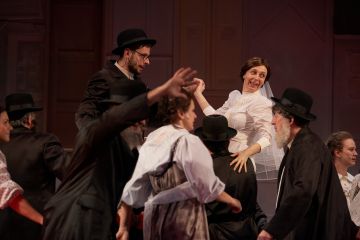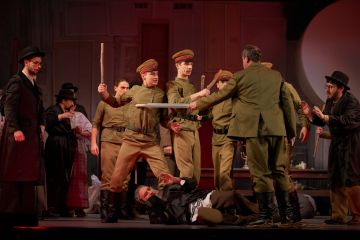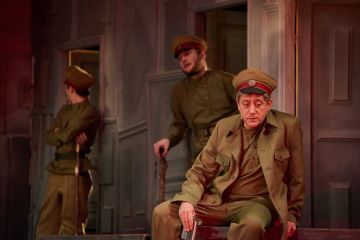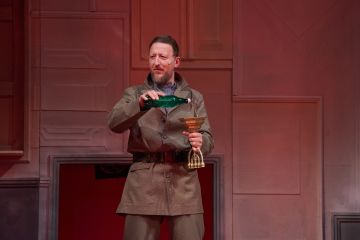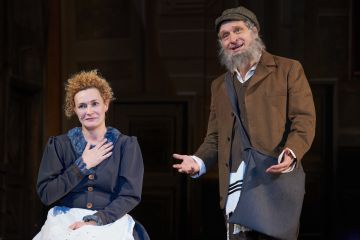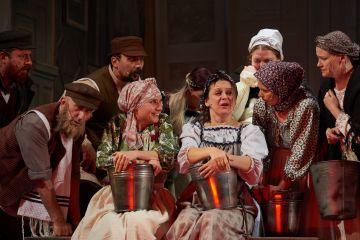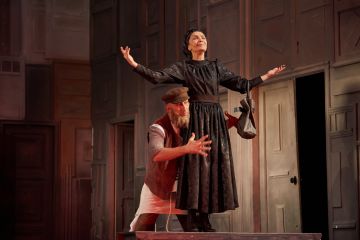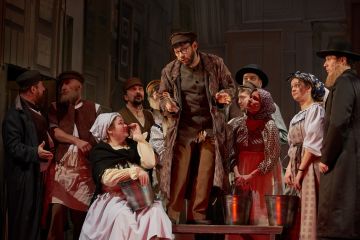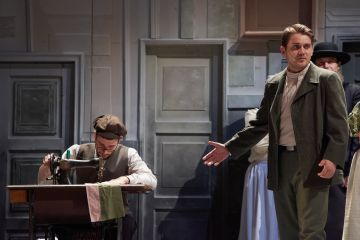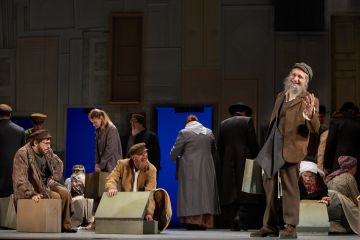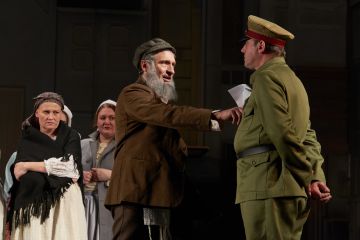On the contrary, we have in front of us a large group of actors, with well-defined roles, who construct their characters by building on each other’s energy; that is how the Jews survived the horrors of history of which they had many; for them “all for one” was not merely a phrase, neither “one for all” was forgotten (this is how the leaders of Jewish communities appeared and asserted themselves, as well as have written history).
Nona Rapotan: „Și tu ai dreptate!” [“You are also right!”], Bookhub.ro, February 22, 2020
We have seen Zsolt Bogdán portraying main characters numerous times on the Cluj stage, and his talent has long been recognized, however, in Tevye, he just takes our breath away. Whoever thinks they have seen great actors in Hollywood movies should go see Zsolt in the Fiddler, and find out where real acting begins.
Csaba Nanó: Mit keres a hegedűs a háztetőn? [What is the Fiddler Looking for on the Roof?], Krónika, Erdélyi Napló, February 27, 2020
... with “Fiddler on the Roof”, a show that means a successful confrontation with the iron rules and the exigencies of musical theatre - and not just in any which way, but taken at the level of detailed perfection -, I do believe I am not exaggerating when I say that we are witnessing an exceptionally valuable phenomenon. (…)The artists of the Hungarian Theatre of Cluj did this by also saying wise words and lines, and inviting audiences to meditate upon these, lines infused with humor, and with irony, but also with a superior sense of self-irony, and with emotion, and sadness, and revolt, and the resignation from which stems the strength to begin anew, start from the beginning again, but also with singing and dancing. And not just in any which way. But in a surprising, brilliant, truly flawless manner.
Mircea Morariu: Emoție, trăire, pasiune [Emotion, Experience, Passion], amfiteatru.com, February 26, 2020
Tevye is not a cardboard sheet for the playwright to write his slogans upon and the viewer to find in writing the schematic thinking with which he may have been previously accustomed. Tevye, especially in Zsolt Bogdán’s highly humanistic rendition, is what we would discover if we would bother to look in the mirror more often, even when we believe we are doing our best in the world.
Mihai Brezeanu: Salid y disfrutad - Hegedűs a háztetőn / Fiddler on the Roof, liternet.ro, February 2020
One thing is surely proven beyond a doubt, namely that the company of the Hungarian Theatre of Cluj can play practically anything. This is also the biggest virtue of this production: we can see the entire company on stage, quite often at the same time during the performance, doing things we may not have seen them do before. (...)
Zsolt Bogdán plays the leading role of Tevye, the milkman, and exploits the full potential offered by this role. We have seen him play few humorous characters , especially of this kind of cabaret humor, but he is very good at it, moreover, he commands the audience just the way he wants. Portraying Golde, Tevye’s wife, Emőke Kató is the right partner in this context, as she easily handles the rhythm of the comedy, distorts her acting in just the right places for achieving a humorous effect. I would like to emphasize this light-heartedness also on the part of Melinda Kántor (Yente, the matchmaker), as her comical stage presence – characteristic for this particular genre -, means that the audience starts to laugh as she steps on stage.
Botond Fischer: Ilyen ez a popszínház/Such Is Pop Theatre; Helikon Literary Magazine, March 10, 2020
The story is clearly the story of a Jewish family, a Jewish community, and yet, when Tevye first talks to God and bargains with Him about what to do about the particular tradition that would ruin the happiness of her beloved daughter - the situation becomes infinitely familiar, it touches us. From here on, thanks to some simple but ingenious solutions by the characters, including Zsolt Bogdán, who plays the main character, the story is about me and you, about us, about us as a forever minority, who, for this or that reason we suddenly become unwanted elements in Anatevka, who should leave, change, replace an old, obsolete tradition by a new one – still, is it us who are moving, or as victims of our inertness, immobility, what we will soon leave behind will also be nothing else than stones and crosses…
Márta Bodó: Hegedűs a háztetőn [Fiddler on the Roof], romkat.ro, March 05, 2020
Béres László’s direction builds the mounting tension in the play with great subtlety, yet with remarkable consistency. And this was made all the more memorable by the performance of the Cluj Hungarian company, in which they seize upon each moment, peppering it with abundant helpings of humour. One could tell from the outside as well that they were delighted to perform in this play.
However, considering the entirety of the work, the greatest emphasis is placed on tension, the subtle unfolding of the expected and ever more tragic final conclusion, inevitable, yet only attainable along a gradual, point-by-point itinerary. The humorous scenes at the beginning precipitating smiles and laughter were increasingly replaced by a sense of baleful expectancy even in audience members who were familiar with the play.
Miklós Gábor: Kolozsvári Mazel Top és temesvári Tragédia [Mazel Top from Cluj and Tragedy from Timișoara], nyugatijelen.com, 8 August 2021
The cream of the crop at the theatre makes their appearance as the inhabitants of the cosy village of Anatevka. They can do a synchronised and quite lively dance. They are not your average, ‘choreographer-drilled’ and ‘string-puppet’ dance troupe, all wearing the same uniform grin, or curling their lips downwards on command. They all have individual personalities and auras. I don’t know where to fix my eyes, since I want to see each of them at the same time. They are instantly endearing. They don’t press forward unless it’s needed; they’re content to stay in the background, yet their presence is still distinctly felt. They have a decisive role in making this show such a hit.
Bóta Gábor: Le a kalappal! [Hats off!], nepszava.hu,14 August 2021
In the show, musical acting blended with the performance style of the actors from Cluj, who are more versed in prose. Carmencita Brojboiu’s set evoked the small Ukrainian village with pleasant pastel colours, where the multitude of paint-smudged doors made the scenes appear to take place in both interior and exterior spaces.
Lengyel Emese – Sorbán Csenge: Erdélyi Hét pontról pontra [Transylvanian Week step by step], barkaonline.hu,16 August 2021











